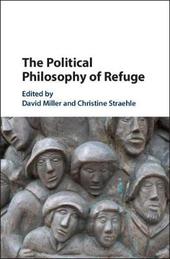
|
The Political Philosophy of Refuge
Hardback
Main Details
| Title |
The Political Philosophy of Refuge
|
| Authors and Contributors |
Edited by David Miller
|
|
Edited by Christine Straehle
|
| Physical Properties |
| Format:Hardback | | Pages:266 | | Dimensions(mm): Height 234,Width 156 |
|
| Category/Genre | Philosophy
Social and political philosophy |
|---|
| ISBN/Barcode |
9781108472159
|
| Classifications | Dewey:325.2101 |
|---|
| Audience | | Professional & Vocational | |
|---|
| Illustrations |
Worked examples or Exercises
|
|
Publishing Details |
| Publisher |
Cambridge University Press
|
| Imprint |
Cambridge University Press
|
| Publication Date |
21 November 2019 |
| Publication Country |
United Kingdom
|
Description
How to assess and deal with the claims of millions of displaced people to find refuge and asylum in safe and prosperous countries is one of the most pressing issues of modern political philosophy. In this timely volume, fresh insights are offered into the political and moral implications of refugee crises and the treatment of asylum seekers. The contributions illustrate the widening of the debate over what is owed to refugees, and why it is assumed that national state actors and the international community owe special consideration and protection. Among the specific issues discussed are refugees' rights and duties, refugee selection, whether repatriation can be encouraged or required, and the ethics of sanctuary policies.
Author Biography
David Miller is Professor of Political Theory at Nuffield College, Oxford. His publications include Justice for Earthlings (Cambridge, 2013), Strangers in Our Midst: The Political Philosophy of Immigration (2016), and Is Self-Determination a Dangerous Illusion? (forthcoming). Christine Straehle is Professor for Practical Philosophy at the Universitat Hamburg and Associate Professor at the University of Ottawa. Her publications include Vulnerability, Autonomy and Applied Ethics (2016).
Reviews'The Political Philosophy of Refuge brings together the top scholars in the field for timely commentaires on the key debates surrounding refugees. The volume's scope and accessible writing style make it an ideal introductory text, while the innovative arguments are sure to advance refugee research in interesting ways.' Markus Schulzke, University of York
|